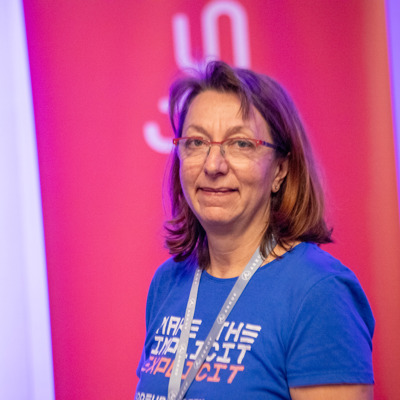- Kontakt
-
stefan.bente[at]th-koeln.de
+49 2261 8196 6367
Discord Server
Prof. Bente Personal Zoom
- Adresse
-
Steinmüllerallee 4
51643 Gummersbach
Gebäude LC4
Raum 1708 (Wegbeschreibung)
- Sprechstunde nach Vereinbarung
- Terminanfrage: calendly.com Wenn Sie dieses Tool nicht nutzen wollen, schicken Sie eine Mail und ich weise Ihnen einen Termin zu.
Guest Lectures in Domain Driven Design Master course
There will be three guest lectures in our DDD Master Course this winter semester. They are open to anyone interested, not just the Master students or TH Köln employees.
- 29.11.24, 10:00 - 12:00 (remote): Krisztina Hirth - “From the Problem to Software”
- 13.12.24, 10:00 - 12:00 (remote): Oliver Drotbohm - “Bottom-up Architecture – Bridging the Architecture Code Gap”
- 10.01.25, 10:00 - 12:00 (in presence on campus): Annegret Junker - “Real-World Project Journeys Using DDD” (working title)
Krisztina Hirth: From the Problem to Software

It is not the domain experts knowledge that goes in production, it is the assumption of the developers that goes into production.
This famous quote from Alberto Brandolini is unfortunately true but it also points to the right direction: we need to bring the domain knowledge into our software. This time Krisztina will show you how this can be done in the day to day business, she will share her experience including the list of techniques needed to succeed in having real Domain-driven development. This won’t be a slide show, challenges, questions are welcome!
About the Speaker
Krisztina Hirth is Software engineer for more than 20 years, always looking for the right way to deliver reliable, resilient and expandable value through software, knowledge and empathy. Lately, she has changed roles to help teams and companies to understand the benefits of domain-driven design, to enjoy discovering models before applying patterns :). She believes that agility is nothing else than feedback-driven development, that DDD and domain modelling reduce the waste of energy, time and future technical debt, and that work must be fun.
Time and Location
The guest lecture takes place Fr 29.11. 10:00 - 12:00. It will be given remotely, as part of the DDD Master Course. However, it is open to everyone interested. You can either join …
- onsite in room 0505 in campus building LC6 (see directions), or
- remotely by joining via Zoom link https://th-koeln.zoom-x.de/j/62835437755?pwd=tkkFTJLuuDlb1l8TSXwxtm9R5kZm0s.1.
Additional Material
- Speaker’s profile page
- Miro board with lecture material
- Youtube video of an earlier version of this lecture
Oliver Drotbohm: Bottom-up Architecture – Bridging the Architecture Code Gap

Hard to change code bases often suffer from two primary problems: a lack of alignment with domain boundaries and failure to effectively express architectural ideas in code. To address that critical issue, developers have turned to Separation of Concerns Architectures, such as Onion-, Clean and Hexagonal Architecture. However, these approaches typically yield mixed results, as they primarily focus on separating technical and business code, without addressing the structural aspects of the domain.
This presentation explores strategies for transferring architectural ideas and design pattern languages into code at various levels of abstraction. We will discuss how different frameworks and libraries in the Java ecosystem can aid in this process, leveraging the presence of meta-information within the code to support critical aspects such as structural verification, testability, and documentation. By employing these approaches and tools, developers can write more maintainable code that is less susceptible to degradation over time.
About the Speaker
Oliver Drotbohm is a member of the Spring engineering team at Broadcom. His work focused on software architecture, DDD, REST, and persistence technologies. His new book, “Modulithic Applications with Spring”, is due for release in 2025.
Time and Location
The guest lecture takes place Fr 13.12. 10:00 - 12:00. It will be given remotely, as part of the DDD Master Course. However, it is open to everyone interested. You can either join …
- onsite in room 0505 in campus building LC6 (see directions), or
- remotely by joining via Zoom link https://th-koeln.zoom-x.de/j/62835437755?pwd=tkkFTJLuuDlb1l8TSXwxtm9R5kZm0s.1.
Additional Material
Annegret Junker: “Real-World Project Journeys Using DDD”
![]()
In praxis, DDD can help to design APIs and an entire environment. The talk discusses practical examples and how they helped to define understandable and well-designed APIs.
- The total technical API and how it becomes a business API
- The world-domination API and how it can be tailored nicely
- 40 services and no API to see - how DDD helps to combine services to senseful combinations
- Prototypic process and how to apply it in practice
About the Speaker
Annegret Junker is Chief Architect at codecentric AG. She has been working for more than 30 years in software development in various roles and different domains such as automotive, insurance, and financial services. She is particularly interested in DDD, microservices and and everything related to it.
Time and Location
The guest lecture takes place Fr 10.01.25 10:00 - 12:00, as part of the DDD Master Course. However, it is open to everyone interested. You can either join …
- onsite in room 0505 in campus building LC6 (see directions), or
- remotely by joining via Zoom link https://th-koeln.zoom-x.de/j/62835437755?pwd=tkkFTJLuuDlb1l8TSXwxtm9R5kZm0s.1.
Additional Material
References
All texts and fotos are (c) by the respective speakers.